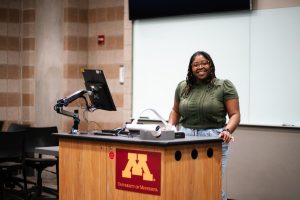DePaul University in Chicago recently enrolled its first class of students without looking at any standardized test scores.
Instead, the students’ applications included short-response questions designed to evaluate whether they possessed certain “noncognitive” variables, like leadership, long-term goals and the ability to deal with setbacks, which can help predict collegiate success.
While many colleges and universities are looking beyond test scores and GPAs in the admissions process, academic performance is still widely used as the first consideration.
The University of Minnesota uses a holistic admissions process in which academic preparation is the primary factor, said admissions director Rachelle Hernandez.
Most studies demonstrate that grades are the greatest predictor of college success, said Jerome Lucido, executive director of the University of Southern California’s Center for Enrollment Research, Policy and Practice, but these aspects are tied with economic advantage.
Noncognitive variables can level the playing field, he said.
“These variables have real promise to differentiate among applicants, particularly those applicants who have come from disadvantaged backgrounds or backgrounds that are less familiar with the college environment,” he said.
University applicants have the option to write a personal statement to give more information.
The University looks for “overcome factors” — like an educational or financial barrier a student has dealt with — in the student’s personal statement, Hernandez said, adding that students comment more often than not.
“I think [noncognitive variables] need to play an increasing role,” Lucido said.
Many schools base their evaluation of noncognitive variables on the research of William Sedlacek, a University of Maryland professor and pioneer in the field.
Throughout several decades of research, Sedlacek has identified eight variables, including positive self-concept, an ability to navigate the collegiate system and having a strong support person. These variables can be measured through letters of recommendation, essays, interviews and self-assessment.
Sedlacek provides his research on the topic to universities without charge.
“I think that’s the way that you get change,” Sedlacek said. “By making it in the person’s self- interest.”
While a systematic and codified look at noncognitive variables hasn’t grown, Lucido said, an increasing number of schools are using holistic review — paying attention to both in-school and out-of-school experiences.
Chemistry sophomore Callahan Clark said she thinks admission should be based on a combination of factors.
“I think academic success should be heavily weighted,” she said. “But I definitely think test scores don’t tell the whole story.”
The University of Wisconsin-Madison has a similar admissions strategy to the University’s. John Lucas, a university spokesman, said officials use a comprehensive review in which academic preparation is the most important factor.
Applicants to Wisconsin can also provide a personal statement.
Alternatively, University of Nebraska-Lincoln admission officials don’t look at noncognitive variables, said Alan Cerveny, the school’s dean of academic services and enrollment management
He said the university is always interested in what other schools are doing to improve admissions decisions, but people are very familiar with the standard forms of measurement.
“I do think it’s a fascinating topic,” he said.














